How is the District planning to improve rent control?
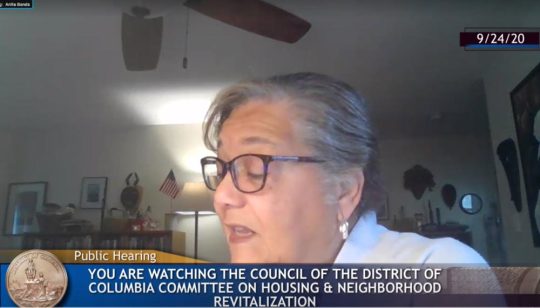
Last month, The D.C. Council Committee on Housing and Neighborhood Revitalization held the first of several planned hearings to discuss five proposed bills to close loopholes in local rent control.
The District’s rent control law is based on the Rental Housing Act of 1985 and applies to all housing accommodations, however there are exemptions.
Many testified that the law is insufficient to protect renters from facing homelessness or being priced out of the city. And a number of the public witnesses turned out to specifically support separate, more-robust legislation that is expected to receive a hearing in November.
By Aoife Maher-Ryan | Read the full story

COVID-19 Made It Even Harder For Unhoused Washingtonians To Find Bathrooms
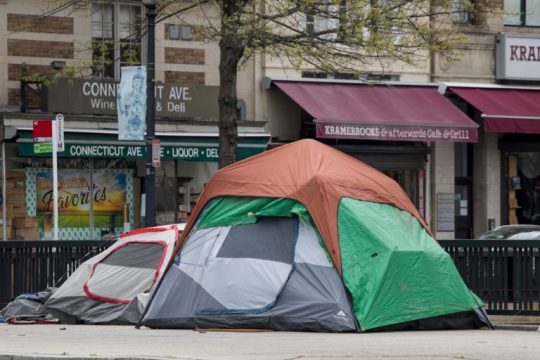
Robert Turner used to use the bathroom at Starbucks locations and public libraries in the heart of D.C. But when the COVID-19 pandemic hit, Turner, who is 41 and has lived on the street for five years, was shut out of his usual spots.
“It’s been harder, and you ain’t got no resources during this,” he said while standing outside of Union Station on a recent day, holding his tent in one hand and his sleeping bag in the other. Turner sleeps in different places around the city on different days. He pitches his tent in parks, near office buildings, and outside Metro stations.
For Washingtonians experiencing homelessness like him, the pandemic has made it even more difficult than normal to find public restrooms and places to wash oneself — at the very moment these residents need them most.
By Kelly Anderson | Read the full story

A national group of mayors is pushing for a guaranteed income, but without leadership from DC

A guaranteed income is a monthly cash payment made directly to any citizen who qualifies with no strings attached. Though it is similar in concept to a universal basic income, it is normally targeted to low-income residents, rather than all residents.
Since June, 25 mayors from across the country have united to call for a guaranteed income at the federal level and have begun studying programs in their cities through Mayors for a Guaranteed Income (MGI). Following the success of Stockton, California’s guaranteed income program, its mayor, Michael Tubbs, founded the organization and began recruiting fellow mayors to support similar models.
Washington D.C. Mayor Muriel Bowser has not signed on and her office did not respond to requests to comment.
By Annemarie Cuccia | Read the full story

From evictions to deaths, a look back at media coverage of homelessness in the District over the past year
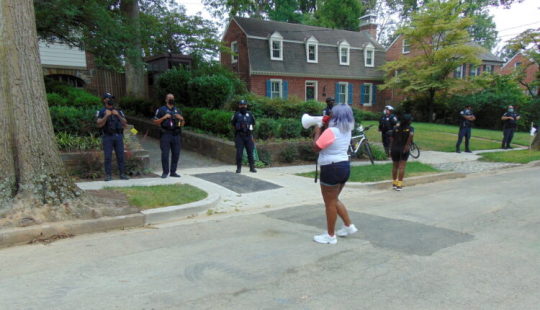
A look back at some of the local media’s articles, columns and commentaries from the past year that stand out on the subject.
By Chris Kain | Read the full article

How To Vote Without A Home Address? D.C. Groups Worked To Register People Experiencing Homelessness
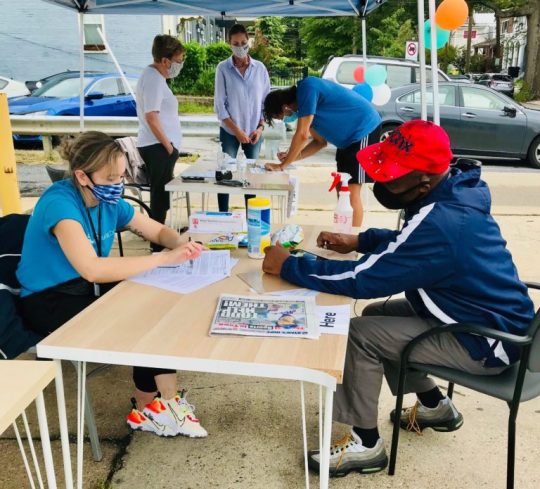
Over the course of the two-month campaign, Pathways to Housing D.C. registered 115 people who currently or previously experienced homelessness to vote.
Pathways staff and volunteers addressed an almost foundational question: how can you register to vote if you don’t have an address to call your own, even more so during an election D.C. is hoping to conduct largely by mail?
They worked to identify mailing addresses for people who might have access to them, and when one wasn’t readily available, used the address of either the Pathways office or the Downtown Day Services Center. That way, people without homes of their own could still get their ballots in the mail.
By Martin Austermuhle | Read the full story

Zoning Commission to Consider Expanding Inclusionary Zoning in DC Next Month
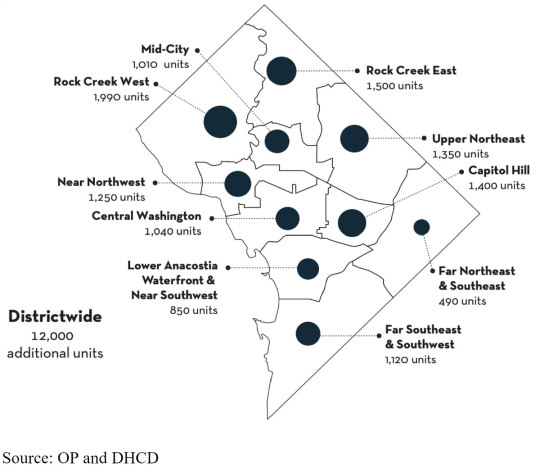
At the beginning of the year, DC’s Office of Planning (OP) filed a zoning application seeking to increase inclusionary zoning (IZ) requirements in an effort to achieve more affordable housing production citywide.
The Zoning Commission is gearing up for another hearing on the topic next month.
Approval of expanded inclusionary zoning would amend the zoning code to require that mixed-use and residential projects that used a map amendment to add density or change the site’s use from non-residential to residential provide 10 to 20% of the residential gross floor area (GFA) as inclusionary zoning, up from the current requirement of 8 to 10%.
By Nena Perry-Brown | Read the full story

Legal Evictions Are Banned, But ‘Invisible’ Evictions Are On The Rise
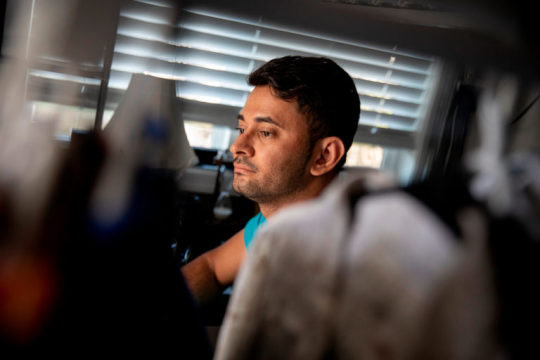
Denis Gallegos was two months behind on rent when he came home to find his locks had been changed.
…
Lawyers who represent low-income renters in the D.C. area say they’re encountering more stories like this as the pandemic lurches into its seventh month.
The reason, they say, is the extreme economic uncertainty wrought by the crisis, combined with waning government assistance. The region’s jobless rate was close to 7% in August, unemployment benefits are running out, and as many as 715,000 renters in D.C., Maryland and Virginia are now at risk of eviction, according to the Aspen Institute.
By Ally Schweitzer | Read the full story

Commentary: Drop the euphemisms and other coded language in the fight against hunger and homelessness

The federal government describes food insecurity as “a lack of consistent access to enough food for an active healthy life.” It is not to be confused with hunger, which “refers to a personal, physical sensation of discomfort.”
Help us.
Euphemisms like food insecurity, food deserts and housing insecurity rile me. They misdirect the public’s attention from critical problems in society — problems that with more competent government managers and a galvanized citizenry could be substantially mitigated, if not solved.
By jonetta rose barras | Read the full column

Low-barrier shelter residents say staff abuse them amid ‘terrible’ conditions during COVID-19
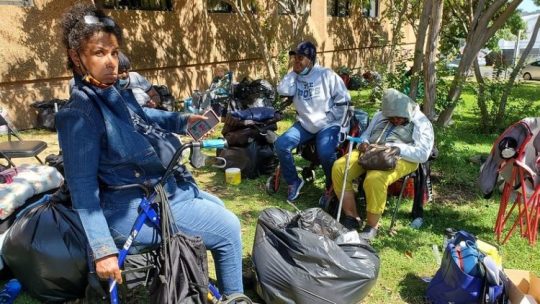
More than 100 women experiencing homelessness were cast out of the Harriet Tubman Women’s Shelter during a Sept. 22 deep clean of the building. While out on the lawn, some told stories of verbal abuse from staff and guards. They say the rules and conditions are pushing them to their breaking point.
By Athiyah Azeem | Read the full story

“It’s an Open Air Drug Market”: Business Interests Push for Policing at Adams Morgan Park Where Homeless, Nearby Residents Gather
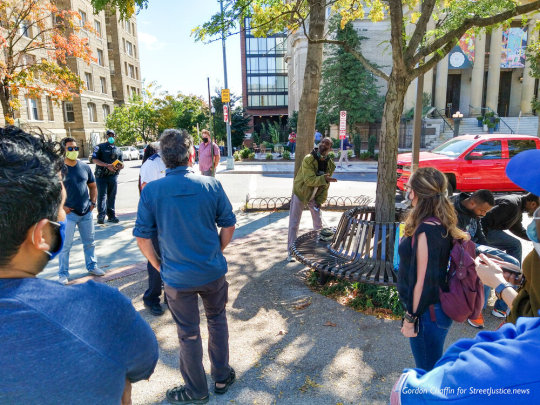
Over the last few months, some Adams Morgan business owners and residents have pushed for a more aggressive effort to police Unity Park of alleged illegal activity, including drug use, drug sales, drinking, and public urination/defecation. The triangle park, formed by Champlain, Euclid, and Columbia Rd NW, is a popular gathering place for residents, some of whom may be experiencing homelessness. While there may be illegal activity happening at Unity Park, experts Street Justice spoke to say that reactive policing will not solve the multifaceted challenges of Washingtonians who have gathered at Unity Park for decades.
By Gordon Chaffin | Read the full story

Parents Experiencing Homelessness Get Creative Entertaining Their Kids During The Pandemic

Nery Peña and her two daughters, Sadie and Ariella, 6, live in transitional housing provided by Turning Point Center, a two-year housing program for single mothers experiencing homelessness or at risk of becoming homeless. Prior to coming to Turning Point a year and a half ago, Peña was living with her grandmother in a cramped one-bedroom. Now, the bilingual Pre-K teacher has a two-bedroom apartment in Columbia Heights to share with her daughters.
But as the pandemic hit D.C. in March, Turning Point began restricting visitors within the apartment building, not even allowing neighbors in each other’s units. For a time, Peña and her daughters stayed with Peña’s mother on U Street, where they had more space and the girls could interact with Peña’s siblings.
By Chelsea Cirruzzo | Read the full story

D.C. Battles New Pandemic of Domestic Violence-Related Homelessness
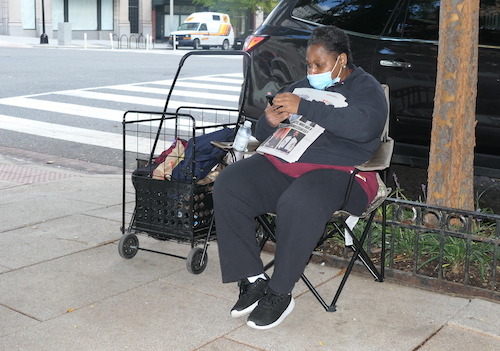
Amid the economic, health and educational uncertainties caused by the coronavirus, an equally virulent pandemic co-exists: the increased instances of intimate partner violence.
On average, nearly 20 people per minute are physically abused by an intimate partner or parent in the United States. In a single year, this equates to more than 10 million women, men, and children. Additionally, 1 in 4 women and 1 in 9 men experience severe intimate partner physical violence, sexual violence, or intimate stalking.
And with schools, businesses, and many outreach services shuttered under COVID-19 mandates, the sudden spike in homelessness among survivors of domestic and intimate partner violence has pushed outreach agencies into new territory.
By
Lindiwe Vilakazi | Read the full story

The at-large candidates who want to change or enhance DC’s rapid rehousing program
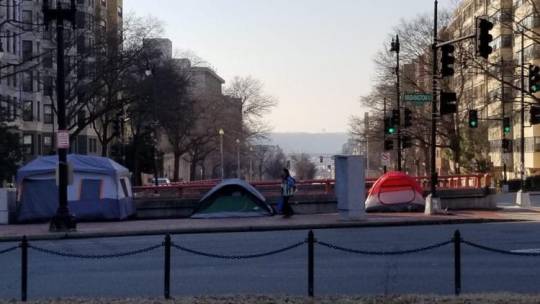
Rapid rehousing is one of D.C.’s most controversial homeless services programs. This election season, at-large candidates Marcus Goodwin, Will Merrifield, and Mónica Palacio have included reform of the program, or investment in it, as part of their campaigns.
By Lilah Burke | Read the full story

Homelessness Was Already Brutal. Washingtonians Explain How The Pandemic Made It Even Worse
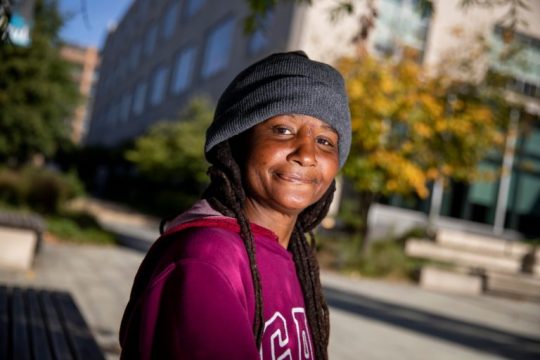
For a day, we walked from Northeast to downtown to speak to people experiencing homelessness. We asked them how the pandemic has altered their lives and what they want people to know ahead of the winter months. Here’s what they shared, in their own words.
By By Jenny Gathright, Elliot C. Williams, and Tyrone Turner | Read the full story

@ 12 pm | No Place To Go: The Quest For Public Restrooms in DC
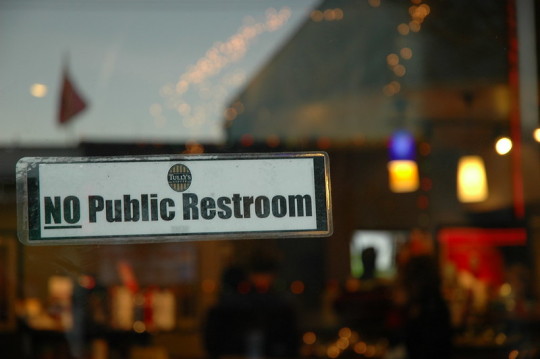
Imagine you’re downtown and you need to use the restroom. Maybe you’re pregnant, diabetic or a runner. Maybe you’re experiencing homelessness and don’t have bathroom of your own. Whoever you are, you don’t have many options.
At noon, we discuss some of the proposed solutions to the lack of public restrooms in the District, and one city-sponsored bathroom-building strategy underway right now.
Produced by Lauren Markoe | Listen here

(Call in at 1-800-433-8850, write to [email protected], or Tweet @kojoshow)
Being Homeless Is ‘The Most Horrible Feeling In The World’
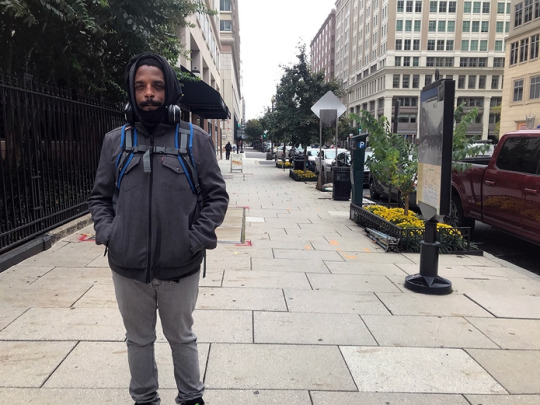
“It’s like being naked, walking around in the streets,” said 41-year-old Marcellus Phillips. “You don’t have anything. It’s hard to have hope. It’s hard to have motivation when you know that you don’t have your name on the lease and you can’t have your own key and go in your own door. You walk around. You watch people do stuff that you want to do, but you can’t because of your circumstances.”
…
Going forward, Phillips wants to help other homeless people experience the success he has found.
“Everybody’s story is different, but people tend to look at the homeless and think that automatically they must be on drugs or they must have done this or that,” he said.
By Michael O’Connell | Read the full story

Of DC’s 24 at-large candidates, who has a specific plan to address homelessness?
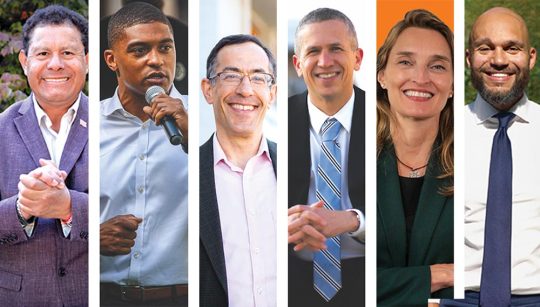
A Street Sense Media analysis determined that only six of the 24 at-large DC Council candidates on the ballot advertised specific plans with measurable goals to address homelessness in their online platforms. We sent them five questions about local poverty.
By Jake Maher | Read the full voter guide

@12:30 pm | What Happens When The Eviction Moratoriums End?

At the beginning of the pandemic, the District enacted an emergency order that put a halt to evictions. However, according to a report from Georgetown University, some landlords are using eviction notices to pressure tenants to pay rent. The report finds that once a tenant is given an eviction notice, a cycle of eviction and housing instability ensues.
And many fear that without any federal relief, the entire region may enter a housing crisis once the moratorium is lifted. Some experts believe that this crisis has already begun in the District.
Produced by Richard Cunningham | Listen here

Call in at 1-800-433-8850, write to [email protected], or Tweet @kojoshow.
Council acts to seal eviction records and tamp down on serial eviction filing
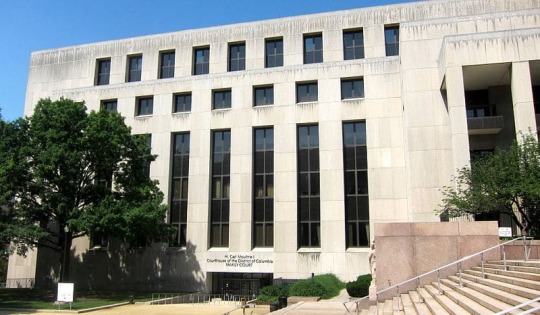
When an eviction action is filed, that filing remains on a tenant’s record permanently, whether or not the action was successful. This record can inhibit a tenant’s ability to secure affordable housing in the future, even if the eviction action was denied or found to be unwarranted, or, as is currently the case, filed illegally during the moratorium.
The D.C. Council unanimously passed a bill on Oct. 6 mandating eviction records be sealed after as little as 30 days if the eviction was not carried out and after three years if it was — allowing the courts to seal records sooner at their discretion. The legislation was introduced by Ward 3 Councilmember Mary Cheh and Council Chair Phil Mendelson.
By Annemarie Cuccia | Read the full story




